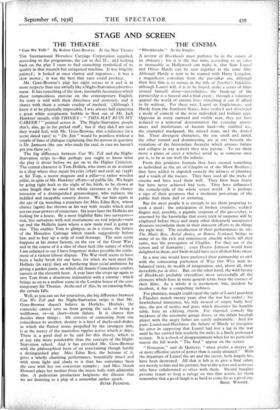"Blockheads," At the Empirt
THE CINEMA
A REVIEW of Blockheads must perforce be in the nature of an obituary ; for it is the last time, according to an edict as immutable as Hollywood can make it, that Stan Laurel and Oliver Hardy can be seen together in the same film. Although Hardy is now to be teamed with Harry Langdon, a magnificent comedian from the pre-talkie era, although their first film is to rejoice in the title of Zenobia's although Laurel will, it is to be hoped, make a series of films around himself alone—nevertheless, the break-up of the partnership is a funeral and a final event ; through a voluntary quarrel the world of cinema loses something it can ill afford to be without. For these two, Laurel an Englishman, and Hardy from the Southern States, have evolved and developed a mode of comedy of the most individual and brilliant type. Opposite in every outward and visible trait, they yet have reduced to a universal denomination the everyday annoy- ances and misfortunes of human kind—the stubbed to:, the crumpled mudguard, the missed train, and the dented hat. Their divergent characters, the one small and timid, the other rotund and domineering, are at one beneath the visitations of the Aristotelian Anangke which ensures failure and collapse in any activity they may pursue. To see them move a piano or erect a wireless aerial is, as someone once put it, to be at one with the infinite.
From this primitive formula they have created something as individual as the art of Chaplin or of the Marx Brothers ; they have added to slapstick comedy the airiness of phantasy and a touch of the rococo. They have used all the tricks of cinema and have used them well. They have been funny but have never achieved bad taste. They have influenced the comedy-style of the whole screen world. It is perhaps a sign of their greatness that a moderate percentage of the public find them dull or irritating.
But for most people it is enough to see them preparing to cook a meal ; the anticipation of broken crockery, scalded fingers and, possibly, a gigantic eruption of the gas-cooker, is seasoned by the knowledge that every trick of suspense will be employed before these and many other deliciously unexpected disasters overwhelm them in their innocent efforts to do things the right way. The recollection of their performances in, say, The Music Box, Aerial Antics, or Bonnie Scotland, brings to many of us the rich and reminiscent chuckle which, till they came, was the prerogative of Chaplin. For they are of the screen and of humanity ; even Doctor Johnson would have delighted in them, and Swift would have seen all their films twice.
In a way one would have preferred their partnership to end with the coruscating perfection of Way Out West with its balanced story, its wealth of imagination, and, above all, their incredible pas de deux. But, on the other hand, the wild lunacy of Blockheads probably crystallises more successfully all the elements which have in more general terms been the essence of their films. As a whole it is incoherent, but, incident by incident, it has a compelling richness.
For phantasy, naught could equal the sight of Laurel guarding a Flanders trench twenty years after the war has ended ; his bewhiskered innocence, his tidy mound of empty bully beef tins, the pot of nettles and grass which decorates his humble table, have an edifying charm. For slapstick comedy the incidents of the automatic garage doors, or the infant baseball player with the angry father are surely unbeatable. And for pure Laurel-and-Hardiness the failure of Hardy to recognise his error in supposing that Laurel had lost a leg in the war until he has carried him tenderly for miles is a finely prolonged ecstasy. It is a shock of disappointment when for no particular reason the fell words "The End" appear on the screen.
"Nonsense," said de Quincey, "must evolve a deeper art or more effective secret of power than is easily attained." With the departure of Laurel the art and the secret, both largely his, have been destroyed. All that is left is to give a final salute not merely to him and his partner, but to the actors and actresses who have collaborated so often with them. Should haughty persons resent so long a eulogy on two film actors, let them remember that a good laugh is as hard to come by as a good cry.
BASIL WRIGHT.










































 Previous page
Previous page